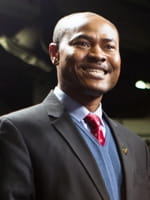Dr. Uchenna Ekwo ’11 is teaching journalists around the world how to integrate messages of peace into their reports.

Dr. Uchenna Ekwo.
Photo credit:
Zef Nikkola.
War correspondents are present at almost every international conflict, reporting on the violence, the disputes, and the ravages of battle. But where are the peace correspondents?
That’s the question that nagged at Dr. Uchenna Ekwo ’11 during his 18 years as a journalist in Nigeria. He saw the influence the media had on debates, conflicts, and in burgeoning democracies and knew that journalists could do more to shape the conversation and promote peace.
“Peace is not typically an ingredient of news,” says Ekwo, a PhD in Public Policy and Administration alumnus. “Journalism training and practice do not seem to recognize peace as newsworthy.”
So Ekwo set out to change that—on an international scale. In 2011, he created the Diaspora Media Initiative as part of the Center for Media and Peace Initiatives, a nonprofit he co-founded in 2005.
“I was able to develop this idea while completing my PhD,” says Ekwo, now a professor of public affairs and administration at Rutgers University School of Public Affairs and Administration in Newark, N.J., and the author of three books on mass media. “Some of the courses I took at Walden also exposed me to international perspectives on a wide range of disciplines that were useful in putting together this program.”
The Diaspora Media Initiative aims to understand the shifting landscape of communication across dispersed populations on five continents, particularly in sub-Saharan Africa. To that end, the initiative has partnered with Rutgers to host a weeklong institute and a six-month certificate program for international journalists.
“Media plays a crucial role in the construction of migrant identities,” Ekwo says. “The influence of technology, increased appetite for freedom of expression, and changing demographics of media audiences in the United States provide unique opportunities for diaspora media to initiate change. Transnational journalism has the potential to put pressure on despots to change behavior and adapt to internationally accepted norms of governance.”
The one-week program features networking, panels, and field trips to meet American journalists in newspaper, radio, and television newsrooms in the New York City area. During the institute, attendees live in the dormitories at Rutgers.
As part of the six-month certificate program, writers from across the diaspora learn to assess government efficiency and spot corruption, work with bureaucrats and public agencies, and work effectively within a growing democracy. The four courses—each running five weeks—are offered online to make them accessible to journalists with busy schedules and in different time zones.
So far the Diaspora Media Initiative has trained editors, producers, photographers, reporters, and civil society leaders on four continents and in 19 countries, ranging from China and India to Mexico, Poland, Kenya, and Haiti.
“It’s important that journalists appreciate their role in peace-building and conflict resolution in a world characterized by intolerance, political paralysis, and a clash of civilizations,” Ekwo says. “The program will bring about lasting, visible change in how news is reported.”
Tell us about your career by emailing [email protected].



